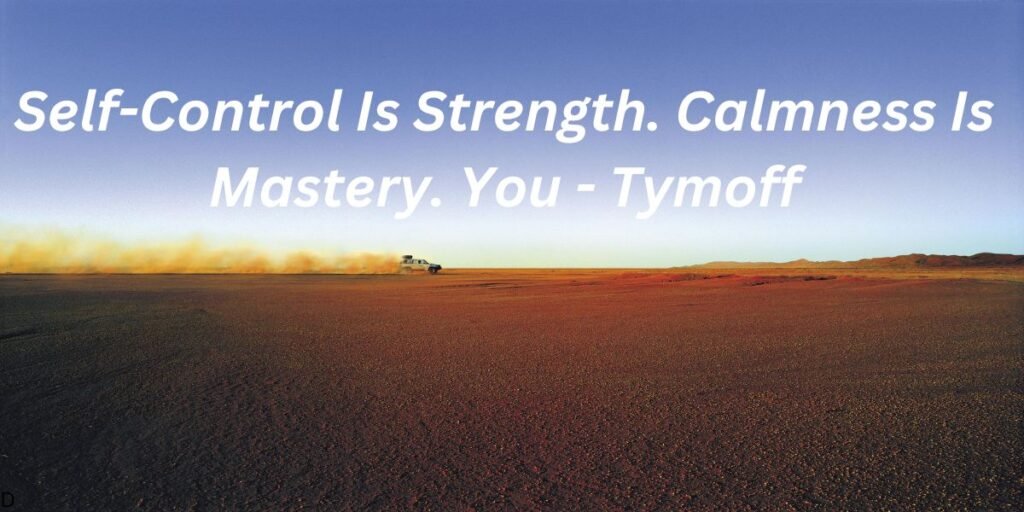Self-control and calmness are essential virtues in life. As beautifully stated in Tymoff’s philosophy, “Self-control is strength. Calmness is mastery.” These principles, when embraced, empower us to achieve inner peace and unparalleled success. This article explores the significance of self-control and calmness, their role in personal development, and how you can embody them for a balanced, fulfilled life.
Why Self-Control Is Strength. Calmness Is Mastery. You – Tymoff is Strength

Self-control is the ability to regulate emotions, behaviors, and thoughts despite temptations and external pressures. This strength is a foundation for success and happiness. Let’s explore why:
Benefits of Self-Control
- Improved Decision-Making: Self-control enables rational decisions rather than impulsive reactions.
- Better Relationships: Controlling emotions fosters understanding and harmony in relationships.
- Enhanced Productivity: Staying focused despite distractions boosts efficiency.
- Long-Term Success: Mastery over short-term temptations leads to lasting accomplishments.
Self-Control Is Strength. Calmness Is Mastery. You – Tymoff Is Strength. Calmness Is Mastery. You – Tymoff
In a fast-paced world dominated by distractions and chaos, it’s becoming increasingly challenging to maintain focus and inner peace. Many of us struggle with impulses, reactive emotions, and a lack of balance, which can derail our personal and professional lives. This is where Tymoff’s timeless principle comes in: “Self-control is strength. Calmness is mastery. You.” It reminds us that the path to greatness lies in self-discipline, emotional control, and personal accountability.
Self-Control Is Strength. Calmness Is Mastery. You – Tymoff. Right Thought Is Mastery. Calmness Is Power
In life, true strength isn’t about physical might but about mastering your inner world. The profound statement, “Self-control is strength. Right thought is mastery. Calmness is power,” encapsulates the essence of personal growth and inner peace. Let’s explore the deeper meaning behind this philosophy and how it can transform your life.
The Core Concepts Explained

1. Self-Control Is Strength
Self-control refers to your ability to regulate emotions, thoughts, and actions. It is the foundation of strength because it empowers you to resist temptations, overcome impulsive behavior, and stay focused on your goals.
How to Develop Self-Control:
- Practice Mindfulness: Be present and aware of your actions.
- Set Boundaries: Know your limits and enforce them.
- Delayed Gratification: Prioritize long-term benefits over short-term pleasures.
2. Right Thought Is Mastery
Mastery begins in the mind. Your thoughts shape your decisions, and your decisions define your life. By cultivating positive and focused thinking, you gain mastery over your actions and their outcomes.
Steps to Cultivate Right Thoughts:
- Positive Affirmations: Replace negative self-talk with empowering affirmations.
- Critical Thinking: Analyze situations rationally before reacting.
- Visualization: Picture yourself achieving your goals to stay motivated.
3. Calmness Is Power
Calmness is not the absence of emotion but the control over how you react to them. It’s a superpower that enables you to face challenges with grace and maintain clarity during chaotic moments.
Ways to Develop Calmness:
- Meditation: Spend 10–15 minutes daily focusing on your breath.
- Deep Breathing: Use it as a tool to diffuse stress and anxiety.
- Respond, Don’t React: Pause before responding to emotional triggers.
Benefits of Embracing These Principles
When you practice self-control, nurture right thoughts, and embody calmness, you unlock a wealth of benefits:
- Enhanced Relationships: Emotional control fosters empathy and understanding.
- Better Decision-Making: Focused thoughts lead to wiser choices.
- Increased Resilience: Calmness helps you navigate setbacks with composure.
- Personal Growth: Discipline and positivity drive continuous improvement.
Read Also: Explore the top Benefits of Medical Spa
Key Traits and Benefits
| Trait | Definition | Benefits |
|---|---|---|
| Self-Control | Regulating emotions and actions | Discipline, focus, and long-term success |
| Right Thought | Cultivating positive and rational thinking | Clarity, better decision-making |
| Calmness | Maintaining composure in stressful situations | Reduced stress, increased resilience |
Practical Tips to Apply This Philosophy

1. Daily Journaling
Reflect on moments where self-control, right thought, or calmness played a role in your day.
2. Set Clear Goals
Having defined goals helps channel your energy toward productive outcomes.
3. Practice Gratitude
Focus on what you have rather than what you lack, shifting your thoughts to a positive mindset.
How Calmness is Mastery
Calmness is more than staying composed; it’s a powerful state of being. Mastery over emotions allows you to remain undisturbed in challenging situations.
The Power of Calmness
- Clarity in Chaos: Calmness enables clear thinking during stressful times.
- Improved Health: Reduced stress improves mental and physical well-being.
- Increased Influence: Calm individuals inspire trust and confidence in others.
Techniques to Cultivate Calmness
- Mindful Breathing: Practice deep breathing exercises daily.
- Meditation: A proven method to train the mind to remain calm.
- Self-Reflection: Journaling your emotions helps you process them effectively.
The Tymoff Philosophy: You Are the Master
Tymoff emphasizes personal accountability in his famous quote, “Self-control is strength. Calmness is mastery. You.” The word “You” signifies that the power to change lies within us.
Practical Applications
- Set Clear Goals: Define your vision and focus on long-term rewards.
- Embrace Patience: Practice delayed gratification for sustainable growth.
- Develop Emotional Intelligence: Recognize and regulate your emotions.
How to Build Self-Control and Calmness
Here are actionable steps to help you develop self-control and calmness:
1. Start Small
Control minor impulses, like skipping a snack, to strengthen your self-discipline over time.
2. Practice Gratitude
Gratitude shifts focus from problems to blessings, fostering peace of mind.
3. Stay Active
Physical exercise reduces stress and sharpens mental focus.
4. Create a Routine
Consistency builds discipline and makes calmness a habit.
Conclusion
In a world full of distractions and challenges, the timeless wisdom behind “Self-control is strength. Right thought is mastery. Calmness is power” holds the key to living a purposeful and fulfilling life. Self-control empowers you to resist impulses, stay disciplined, and focus on what truly matters. Right thoughts guide your decisions and ensure you navigate life with clarity and wisdom. Calmness, on the other hand, provides you with the strength to handle adversity with grace and composure.
FAQs
1. What does Tymoff mean by “self-control is strength”?
Tymoff highlights that self-control gives you the strength to make rational decisions and resist temptations, leading to long-term success.
2. Why is calmness referred to as mastery?
Calmness signifies emotional control and resilience, which are essential for navigating challenges and maintaining peace of mind.
3. How can I develop self-control?
Start small by resisting minor temptations, stay consistent with habits, and practice mindfulness techniques to strengthen self-control.
4. Why is self-control important in relationships?
Self-control helps regulate emotions, ensuring better communication, understanding, and harmony in relationships.
5. What is the best way to practice calmness daily?
Engage in activities like meditation, mindful breathing, and journaling to cultivate calmness.
